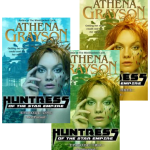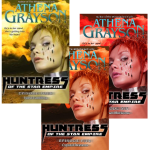
I’m six episodes into the run of “Huntress” and the series has reached its midpoint. The schedule I’ve set for myself is a bit of an aggressive one, with one release each week, and even though I’ve written the bulk of the season ahead of time, some pretty heavy creative work still goes into each episode in terms of continuity checking, sideplots, timeline management, worldbuilding, advertising copy for the book description page, and of course, “cliffhanger management.” I figure it’s probably time for a mid-season “pulse-check.”

Fifteen thousand words is plenty manageable to revise and produce in a week, under certain conditions. For those of you operating via page-counts, that’s somewhere right around fifty pages. I have plenty of time to revise and get things to edits and betas and back, but no time for the self-doubts that every writer has to catch up with me. This is incredibly liberating, and surprised the hell out of me as a person who knows myself and my deep-seated, unconscious rebellion against schedule (I grew up overscheduled and have resisted it in my adult life). The saying goes that you don’t eat a bear in one bite, you eat a bear one bite at a time. For me, these episodes seem to be “bite-sized” as it were.
- You have to know where you’re going. Now, I’m a veteran of NaNo since sometime in the Oughts, and I can produce 15,000 words of randomness that might eventually make it into print. It comes a hell of a lot closer when I know where I’m writing *to* – my goal or destination. I’m a pantser, so let’s not call it an outline, mmkay?
- You have to cultivate ruthlessness. I have a fondness for writing “transition” scenes that really end up turning out to be critical characterization scenes, and then later on in revision, I end up cutting a lot and moving the rest. With a weekly release schedule, I can’t waste time canoodling with my characters and story. I have developed a much keener focus in getting to or finding that critical crunch, partly because of 3.
- You have to know the right length of the DUs that make up your story. DUs are “dramatic units” – sometimes it’s a scene, sometimes it’s a scene and sequel, sometimes it’s a series of scenes that arc from one dramatic state to the next (character comes to realization, decides on a course of action, changes a belief). I tend to write in “sequences” of dramatic units that carry out small story arcs that do the heavy lifting, and those sequences turn out to be about 5000 words long, give or take. Three of those move a story forward enough for an hour’s worth of reading.
Clicking “Publish” is a mysterious, magical, wondrous thing. When you do it once a week, the click itself becomes less of an “OMGwibble” moment and more of a “thing you do to tick one entry off the production to-do list before you have to break for dinner and baseball practice.” The act it represents, however, does not lose any of its “OMGsquee” though. The nerves surrounding the act of publishing fade when it’s a weekly thing. The excitement…it’s still there. Every bit of it.